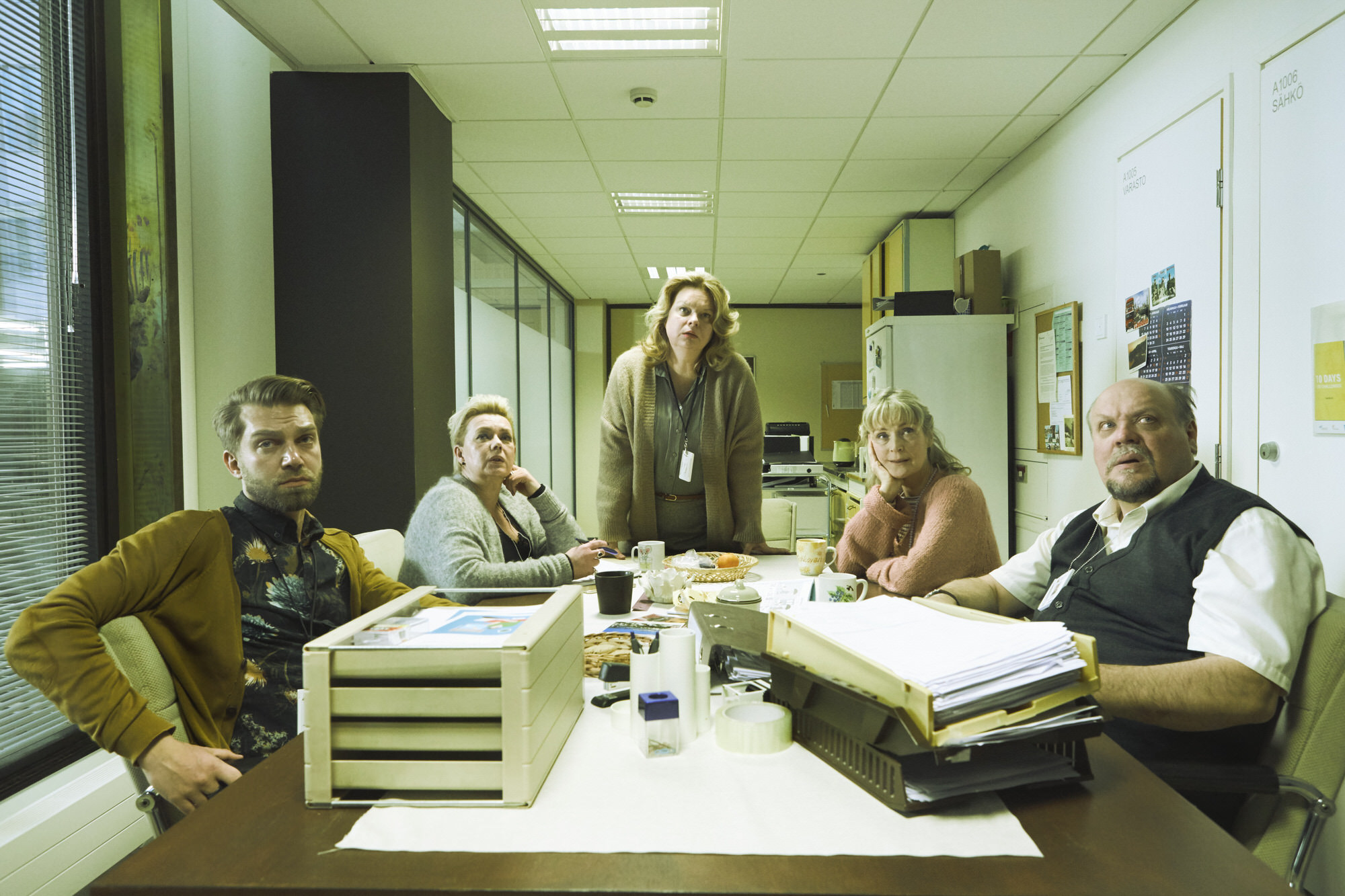
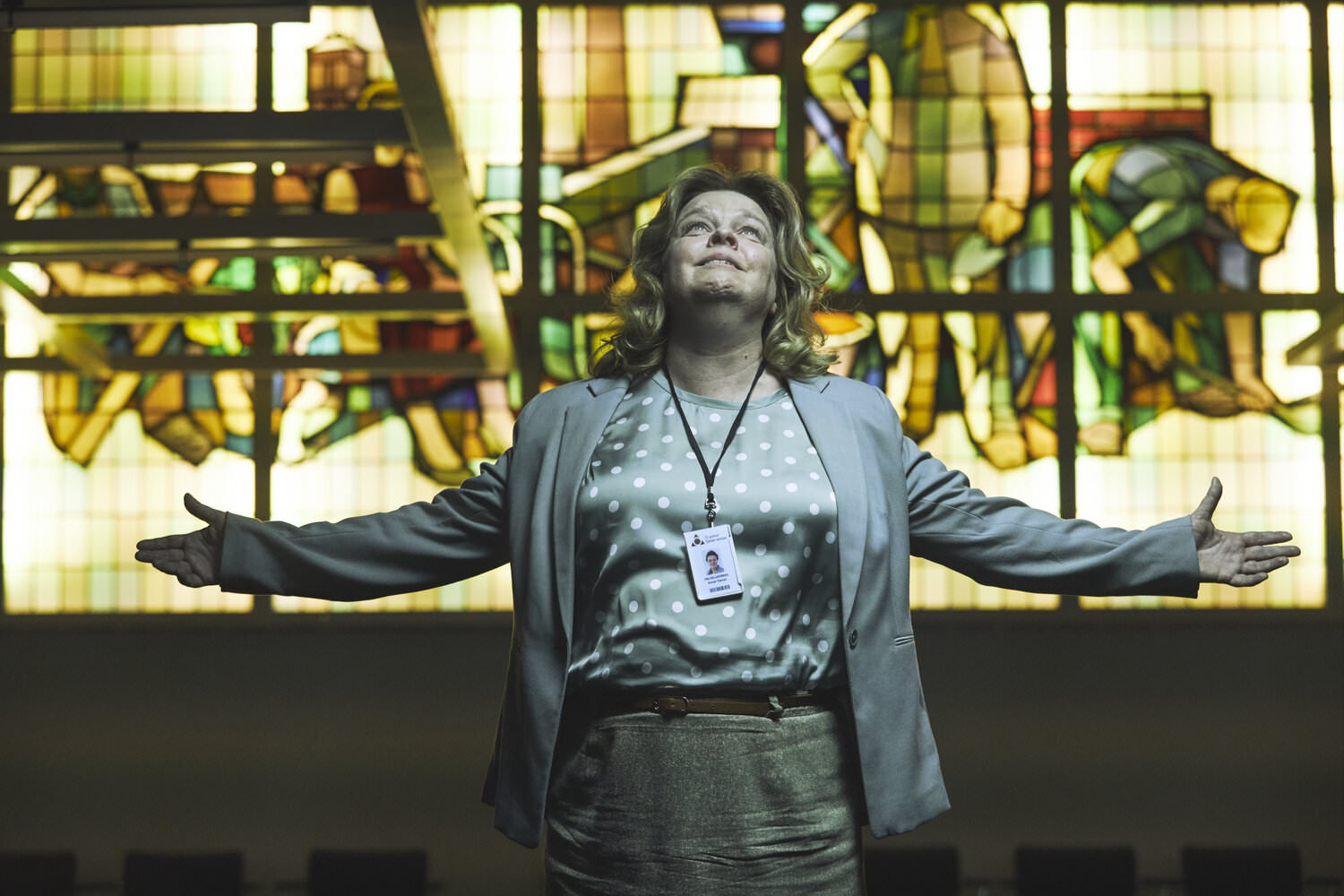
It takes courage to create quality series. Interview with Finnish screenwriter and director Tiina Lymi
The 6th edition of Serial Killer Festival took place in Brno last September. The festival was on my list for a long time, and this was my first visit. As a screenwriter, I am drawn to series because they provide space and are character-oriented. This format allows for more time to build a connection with the characters, a broader and more nuanced portrayal of human nature, and changes in narrative perspective, something not always possible in a film due to its limited running time.
The TV Days conference spanned three days and featured lectures, case studies, and discussions on various challenges faced by creators. Topics included the impact of artificial intelligence on the creative process, transitioning from acting to writing and directing, and strategies for broadcasters and production companies to engage the Gen Z audience and compete with streaming platforms.
The festival screened 40 series from 19 countries and presented the Progressive Killer Award to an outstanding personality from Central and Eastern Europe. The award went to Peter Badač, a producer and former director of the Slovak Audiovisual Fund. His recent dismissal had sparked controversy, so the award served as a friendly encouragement and recognition of his efforts.
The festival’s special guest was the Finnish broadcaster YLE, which is successfully producing its series. Its streaming platform YLE Areena is the most popular streaming service in Finland. Compared to Netflix and HBO, it has the advantage of free access. YLE broadcasts popular series and is not afraid of new formats, such as Instagram series, or current issues, like greenwashing. The question of how to emulate YLE’s success also came up in a discussion between Petri Jauhiainen, head of media at Finnish public broadcaster YLE, and the newly appointed CEO of Czech Television, Jan Souček. Jauhiainen paid tribute to talents and achievements in the history of Czech cinema. His message was: “Discard insecurities because there is no reason not to believe in yourself.”
The festival screened the hit series commissioned by YLE, Welfare Warriors (Sisäilmaa, 2021). The three-episode comedy mini-series follows overworked male and female employees of the Labour Office after the tragic death of their colleague. The series was directed by Tiina Lymi, who also delivered a masterclass at the festival. We talked about her transition from acting to writing and directing, the themes that inspire her projects, and the role of public television.
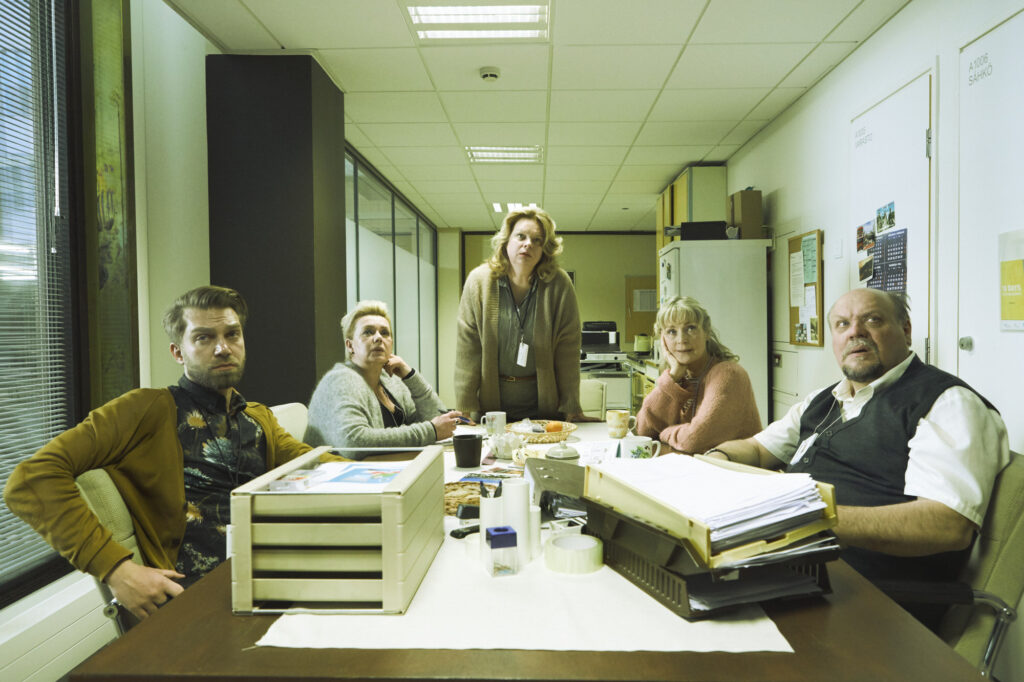
You started out as an actress. Then you switched to writing and directing. How did that happen?
I think it was natural, it just happened to me. I have been writing all my life. When I was a child, I wanted to be a writer, but I got into the theater academy, and then I started getting a lot of work. I worked, worked, worked, had children and life happened, and writing got left behind somewhere. When I was in my thirties, I started writing again, first for the theater, and then I moved to camera work.
Do you still act?
Actually I haven’t done that for about ten years. I prefer writing and directing, but I do not like writing so much that I would do it without directing. It’s too much solitude for my brain structure. I want to be there and see it happen and come alive.
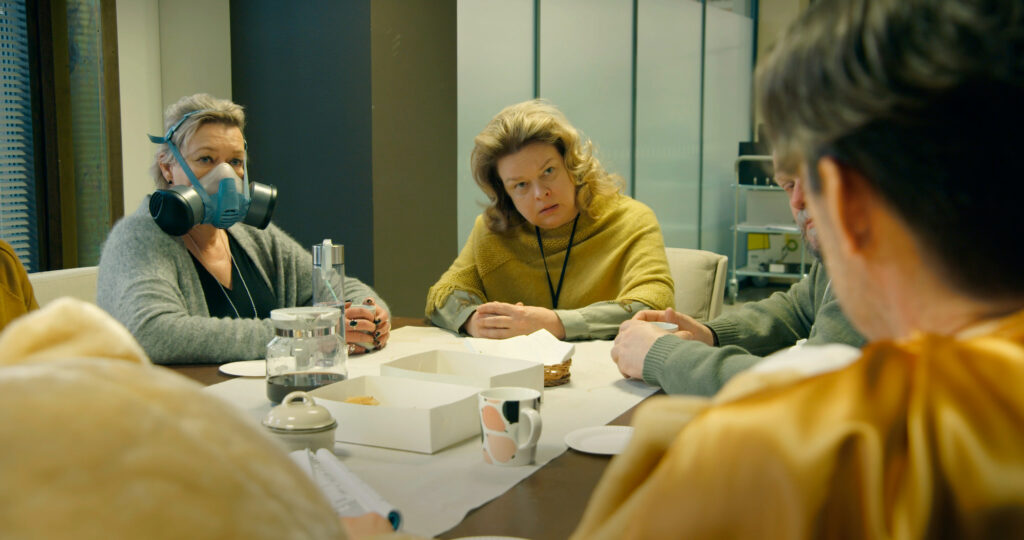
You don’t have to worry about somebody changing it completely, you have control over it.
Yeah, I’m in control of the whole world that I’m creating. It would be very weird for me to just write it and give it to somebody else because of the way I see the film or the TV series. I’m kind of directing and editing it at the same time as I’m writing it. It’s been funny to see other directors’ versions of the plays I’ve written for the theater and compare how I see them and how they see them. And, well, a few times I didn’t understand their point of view at all. But that’s their business, they have the right to do that. But I feel more comfortable directing my own script.
What is most important to you in the process of writing and directing?
I think it’s simply to answer those few questions, you have to know the answer to. How is not that important. What and why is important. And the job of the writer/director is to defend that what and why. There is a lot of interaction around your themes and my job is to defend them. There are a lot of people who come with their professional skills, their ideas, and also people who say it would sell better if you did this or that. My job is to deal with all of them, make the right compromises and pick my battles. It’s very important to know why I want to do this, the value of my film. I often think that I am trying to give people a gift, and I want that gift to be something surprising or awakening or something that you, as a viewer, would be really happy to receive.
How was it perceived when you moved from acting to directing, did you have any problems getting your material made?
Not in the theater, but when I started working for the camera, I did at the beginning. One thing is that you need talent, of course, but you also need stamina. It is a marathon or high-intensity interval training. There are a lot of talented people who lack the ability to fight or run a marathon. If you don’t want to run any more, you still have to run, there are always a few kilometers left.
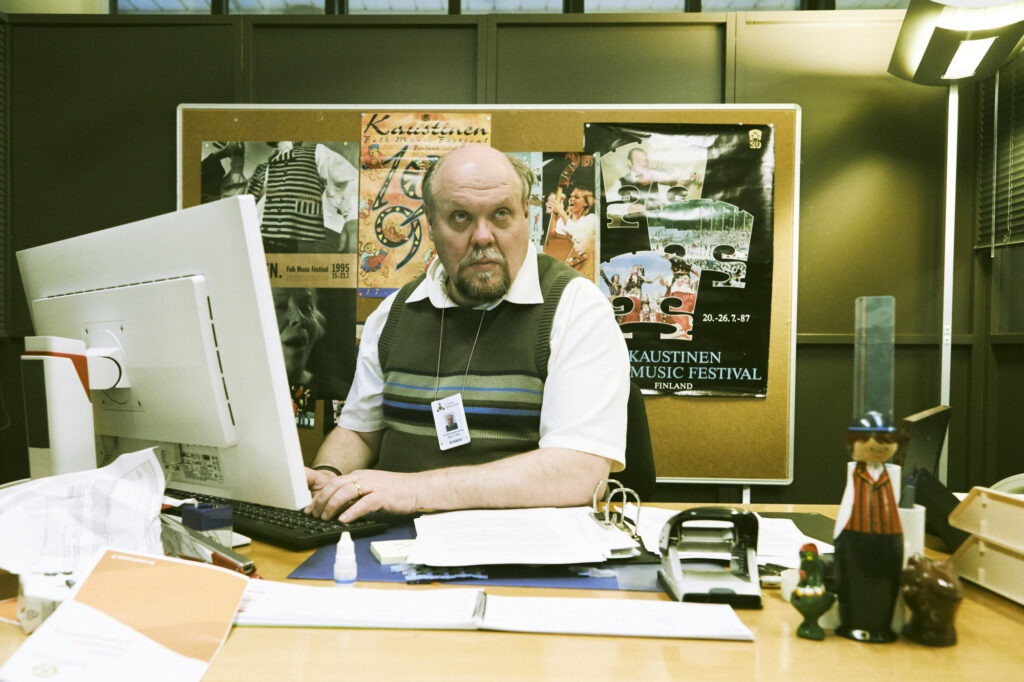
In Slovakia, TV producers seem to be afraid to take a risk with a quality TV series. We lack them.
That’s sad. In the theater we always put art first, always. Decisions are made on that basis. Even though I love doing films and TV series, it is a strange combination of business and art. You have to have the brains and the skills to work your way through that jungle. Because it costs a lot. In the theater you can do something with 2,000 euros or 20,000 euros, with 200,000 euros you can do something huge. But in film you need two million or a million or so. And then, of course, the companies that do it have to be able to survive. So it’s obvious that there’s a contradiction, and it’s like water and oil. They don’t mix well, but you have to find a way.
So, what do you suggest?
Do not underestimate the TV audience, they are not stupid. If you give them shit and there is nothing else to choose from, they will watch shit. But if you give them good stuff, surprisingly, they will prefer it. Take Welfare Warriors. It’s definitely an art house, not mainstream. There were some talks about who’s going to watch it, but in the end everybody in Finland did. Ten years ago there was this imaginary character, this grandmother from Kainuu, which is a remote place in the northern parts of Finland, and someone would always say she wouldn’t understand it. But the thing is that she does. She’s not stupid; she has a brain, she has a heart. If you tell a story well, it impresses people.
What is your approach to making series?
My ambition is to mix the art house and mainstream so I can kind of “hide” the intelligence and “hide” the art in such a way that people want to watch it. But that requires having money people brave enough to listen to the artists. There is a reason why someone is a money person and someone is a creative person. If the money person is wise, they listen to the creative person – otherwise they would be doing the creative content. And if you have a national broadcasting company, it comes from the taxpayers’ money, so it’s their obligation to lift the culture, not put it down. You can’t say we don’t take risks or we don’t do this because it’s funded by the state.
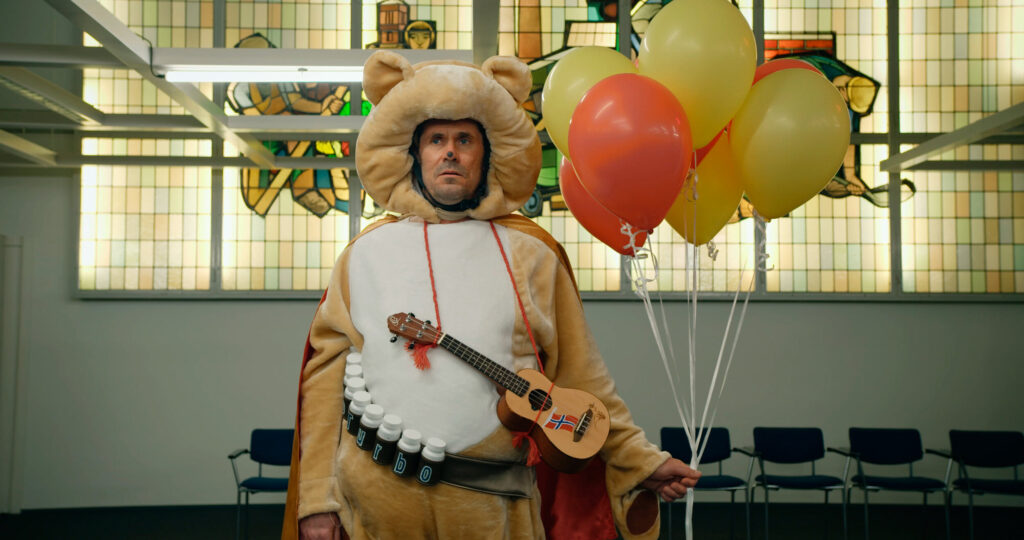
What was your inspiration for Welfare Warriors?
I come from a family that is not rich at all. I was born in 1970 and my childhood was difficult in many ways, my mother couldn’t have paid for anything, not even proper shoes for me. In Finland, in the Nordic countries, we have the welfare system, which worked really well at that time: I got a very good education, I speak five languages for free. In the socio-economic system I climbed a lot of stairs because of the excellent welfare system and the safety net that the government gave to the citizens. Everyone had a chance to reach their full potential.
What’s changed?
It’s not appreciated anymore. At the moment we have a right-wing government in Finland, they are almost like Nazis. They have written terrible things in the past, racist, disgusting, it makes me cry when I think about it. It’s so horrible that I almost can’t breathe. We used to have the best school system in the world, now we don’t. They take money from old people, from disabled people and from education. People from poor families can’t study as much as I did because it’s so expensive to live in Helsinki, to rent a flat, to buy food. And if your parents can’t help you, then you’re in deep shit, you can’t make it. That made me so angry. We’re only about 6 million people and we can’t afford to throw away the welfare system, so that’s why I wrote the series. There is a line where the main character in a game show on TV shouts at the viewers: For fuck’s sake, think about how you vote. Stop this madness. The system is excellent, now you’re destroying it, and that’s idiocy.
What was the reaction of the audience?
They loved it, it was a phenomenon in Finland. It was in the main news for about a week, people were quoting the series. The main character is called Anneli, which is a very common name for older women in Finland, she’s a bureaucrat. I did a lot of research before I wrote it: one person who works in the unemployment office in Finland can have more than 400 clients a month. So if you do the maths, they have seven minutes per person. Can you really map their lives, the help they need, in seven minutes? You are given a task that is impossible to do properly. I got a lot of messages from people who work in government, hospitals, child protection, banks, clothes shops, McDonald’s, wherever. People recognised this feeling that what is being asked of you is too much. You’re not given the chance to do the job properly. The system is corrupt, it doesn’t work for them anymore. It’s just a huge monster that takes energy and resources. A task comes from someone above you and now you have seven minutes to do it. And it’s the same in every area of life. I think that’s what people have realised. And maybe that’s why they vote for neo-Nazis, we want something different, this is not working anymore, I don’t know.
How long did it take to produce the series?
Three years from research to delivery. Now I’m doing another series called Queen of Fucking Everything. It’s about segregation. We are a country that says we don’t have a class society, but in fact we do. There are places in the Helsinki area where it’s like going abroad, I have no contact with people who live in some suburbs. There is a story about strata in society, about worlds that are separated from each other. Some people can get out of trouble because they have money, and some people can’t. They create their own system that works within the larger system. But the point is that everyone should live in circumstances where they feel they can survive. If they don’t, it’s going to be a problem, even for rich people. They end up living inside a fence. It’s the basic idea that if there’s a group of people who are not doing well, it’s going to affect all of us. It’s not just their problem, it’s the whole of society’s problem. Always. And it’s not the solution to blame them for their problems, to put them down more. Then they just get more angry and crazy things start to happen.
What topics are you interested in at the moment? Any ideas you are working on?
At the moment I’m working on the series I just mentioned and a film called Stormskerry Maja. It’s about love and what love actually means to me. It’s something I haven’t dared to face, I had to be this old to have the courage to dig into that. Then I have two other film ideas that I really want to do and I will do them. They are about accepting differences, accepting people for who they are. I’m not very good at explaining my work, but of course I have to do that, it means getting publicity for the things I do. I just prefer to do the work and leave the analysis to the audience.
It sounds like you are exploring it at the same time as you are talking about it.T: And that’s the great thing about this work. The exploring is never finished and it reveals the subject of the thing you are doing as you do it. When we were shooting and then editing Stormskerry Maja, I had so many lightbulb moments. It’s very hard to explain but I think there is a surface layer, what the film is about. And underneath there is another layer. And the deeper you dare to go, there is always something. And what’s very, very deep, like in the basement – what’s there? I don’t know, but you have to be patient. Like in love. Love is acceptance and surrender. So you have to kind of surrender to the subject, to the content. And then it comes over you and you are on a journey. Not just doing something that I have decided to do. It’s more like a journey.
Translation and proofreading: Zuzana Hrivňáková
Pictures:
Welfare Warriors (dir. Tiina Lymi)
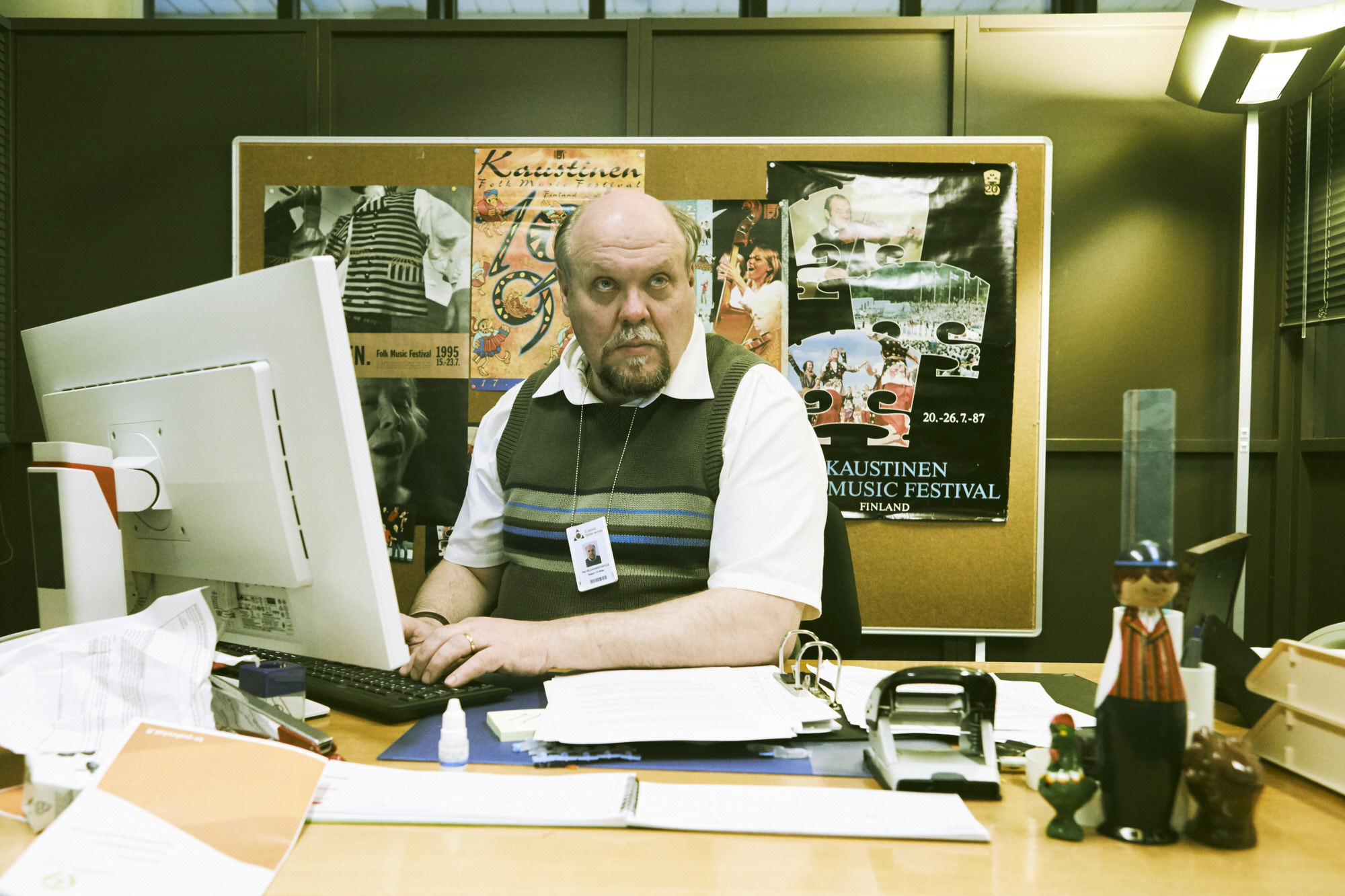
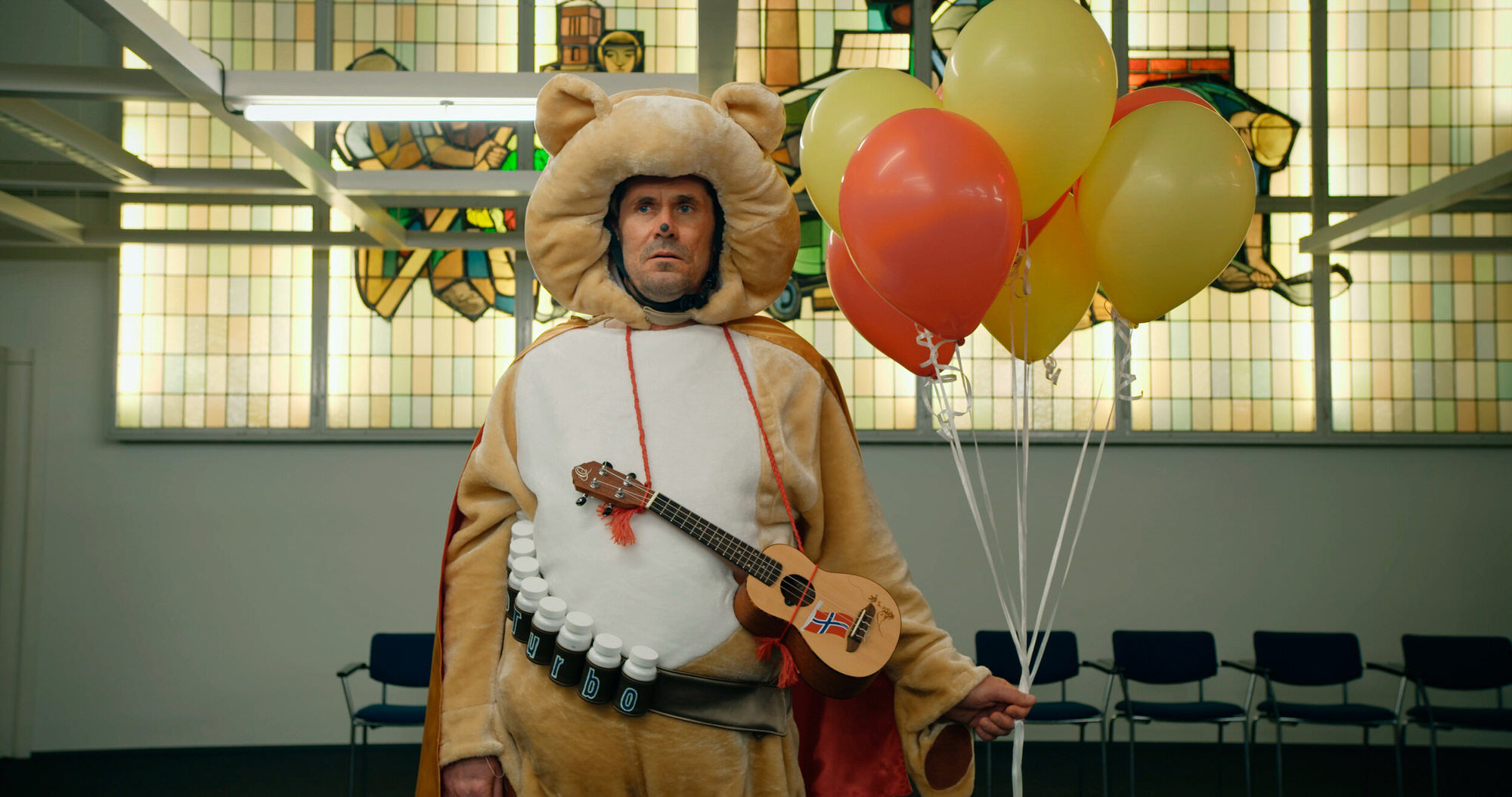
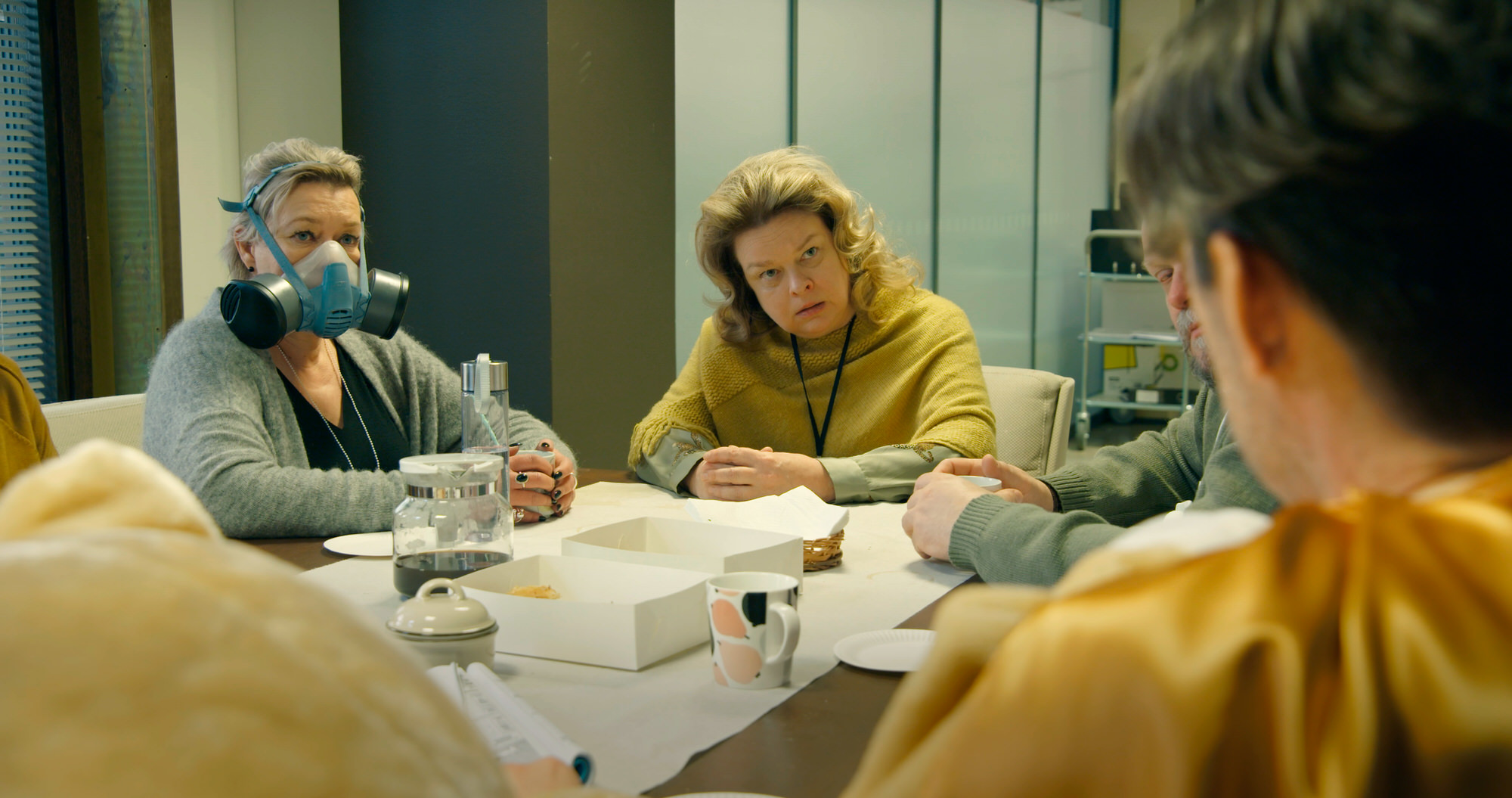

The 6th edition of Serial Killer Festival took place in Brno last September. The festival was on my list for a long time, and this was my first visit. As a screenwriter, I am drawn to series because they provide space and are character-oriented. This format allows for more time to build a connection with the characters, a broader and more nuanced portrayal of human nature, and changes in narrative perspective, something not always possible in a film due to its limited running time.
The TV Days conference spanned three days and featured lectures, case studies, and discussions on various challenges faced by creators. Topics included the impact of artificial intelligence on the creative process, transitioning from acting to writing and directing, and strategies for broadcasters and production companies to engage the Gen Z audience and compete with streaming platforms.
The festival screened 40 series from 19 countries and presented the Progressive Killer Award to an outstanding personality from Central and Eastern Europe. The award went to Peter Badač, a producer and former director of the Slovak Audiovisual Fund. His recent dismissal had sparked controversy, so the award served as a friendly encouragement and recognition of his efforts.
The festival’s special guest was the Finnish broadcaster YLE, which is successfully producing its series. Its streaming platform YLE Areena is the most popular streaming service in Finland. Compared to Netflix and HBO, it has the advantage of free access. YLE broadcasts popular series and is not afraid of new formats, such as Instagram series, or current issues, like greenwashing. The question of how to emulate YLE’s success also came up in a discussion between Petri Jauhiainen, head of media at Finnish public broadcaster YLE, and the newly appointed CEO of Czech Television, Jan Souček. Jauhiainen paid tribute to talents and achievements in the history of Czech cinema. His message was: “Discard insecurities because there is no reason not to believe in yourself.”
The festival screened the hit series commissioned by YLE, Welfare Warriors (Sisäilmaa, 2021). The three-episode comedy mini-series follows overworked male and female employees of the Labour Office after the tragic death of their colleague. The series was directed by Tiina Lymi, who also delivered a masterclass at the festival. We talked about her transition from acting to writing and directing, the themes that inspire her projects, and the role of public television.

You started out as an actress. Then you switched to writing and directing. How did that happen?
I think it was natural, it just happened to me. I have been writing all my life. When I was a child, I wanted to be a writer, but I got into the theater academy, and then I started getting a lot of work. I worked, worked, worked, had children and life happened, and writing got left behind somewhere. When I was in my thirties, I started writing again, first for the theater, and then I moved to camera work.
Do you still act?
Actually I haven’t done that for about ten years. I prefer writing and directing, but I do not like writing so much that I would do it without directing. It’s too much solitude for my brain structure. I want to be there and see it happen and come alive.

You don’t have to worry about somebody changing it completely, you have control over it.
Yeah, I’m in control of the whole world that I’m creating. It would be very weird for me to just write it and give it to somebody else because of the way I see the film or the TV series. I’m kind of directing and editing it at the same time as I’m writing it. It’s been funny to see other directors’ versions of the plays I’ve written for the theater and compare how I see them and how they see them. And, well, a few times I didn’t understand their point of view at all. But that’s their business, they have the right to do that. But I feel more comfortable directing my own script.
What is most important to you in the process of writing and directing?
I think it’s simply to answer those few questions, you have to know the answer to. How is not that important. What and why is important. And the job of the writer/director is to defend that what and why. There is a lot of interaction around your themes and my job is to defend them. There are a lot of people who come with their professional skills, their ideas, and also people who say it would sell better if you did this or that. My job is to deal with all of them, make the right compromises and pick my battles. It’s very important to know why I want to do this, the value of my film. I often think that I am trying to give people a gift, and I want that gift to be something surprising or awakening or something that you, as a viewer, would be really happy to receive.
How was it perceived when you moved from acting to directing, did you have any problems getting your material made?
Not in the theater, but when I started working for the camera, I did at the beginning. One thing is that you need talent, of course, but you also need stamina. It is a marathon or high-intensity interval training. There are a lot of talented people who lack the ability to fight or run a marathon. If you don’t want to run any more, you still have to run, there are always a few kilometers left.

In Slovakia, TV producers seem to be afraid to take a risk with a quality TV series. We lack them.
That’s sad. In the theater we always put art first, always. Decisions are made on that basis. Even though I love doing films and TV series, it is a strange combination of business and art. You have to have the brains and the skills to work your way through that jungle. Because it costs a lot. In the theater you can do something with 2,000 euros or 20,000 euros, with 200,000 euros you can do something huge. But in film you need two million or a million or so. And then, of course, the companies that do it have to be able to survive. So it’s obvious that there’s a contradiction, and it’s like water and oil. They don’t mix well, but you have to find a way.
So, what do you suggest?
Do not underestimate the TV audience, they are not stupid. If you give them shit and there is nothing else to choose from, they will watch shit. But if you give them good stuff, surprisingly, they will prefer it. Take Welfare Warriors. It’s definitely an art house, not mainstream. There were some talks about who’s going to watch it, but in the end everybody in Finland did. Ten years ago there was this imaginary character, this grandmother from Kainuu, which is a remote place in the northern parts of Finland, and someone would always say she wouldn’t understand it. But the thing is that she does. She’s not stupid; she has a brain, she has a heart. If you tell a story well, it impresses people.
What is your approach to making series?
My ambition is to mix the art house and mainstream so I can kind of “hide” the intelligence and “hide” the art in such a way that people want to watch it. But that requires having money people brave enough to listen to the artists. There is a reason why someone is a money person and someone is a creative person. If the money person is wise, they listen to the creative person – otherwise they would be doing the creative content. And if you have a national broadcasting company, it comes from the taxpayers’ money, so it’s their obligation to lift the culture, not put it down. You can’t say we don’t take risks or we don’t do this because it’s funded by the state.

What was your inspiration for Welfare Warriors?
I come from a family that is not rich at all. I was born in 1970 and my childhood was difficult in many ways, my mother couldn’t have paid for anything, not even proper shoes for me. In Finland, in the Nordic countries, we have the welfare system, which worked really well at that time: I got a very good education, I speak five languages for free. In the socio-economic system I climbed a lot of stairs because of the excellent welfare system and the safety net that the government gave to the citizens. Everyone had a chance to reach their full potential.
What’s changed?
It’s not appreciated anymore. At the moment we have a right-wing government in Finland, they are almost like Nazis. They have written terrible things in the past, racist, disgusting, it makes me cry when I think about it. It’s so horrible that I almost can’t breathe. We used to have the best school system in the world, now we don’t. They take money from old people, from disabled people and from education. People from poor families can’t study as much as I did because it’s so expensive to live in Helsinki, to rent a flat, to buy food. And if your parents can’t help you, then you’re in deep shit, you can’t make it. That made me so angry. We’re only about 6 million people and we can’t afford to throw away the welfare system, so that’s why I wrote the series. There is a line where the main character in a game show on TV shouts at the viewers: For fuck’s sake, think about how you vote. Stop this madness. The system is excellent, now you’re destroying it, and that’s idiocy.
What was the reaction of the audience?
They loved it, it was a phenomenon in Finland. It was in the main news for about a week, people were quoting the series. The main character is called Anneli, which is a very common name for older women in Finland, she’s a bureaucrat. I did a lot of research before I wrote it: one person who works in the unemployment office in Finland can have more than 400 clients a month. So if you do the maths, they have seven minutes per person. Can you really map their lives, the help they need, in seven minutes? You are given a task that is impossible to do properly. I got a lot of messages from people who work in government, hospitals, child protection, banks, clothes shops, McDonald’s, wherever. People recognised this feeling that what is being asked of you is too much. You’re not given the chance to do the job properly. The system is corrupt, it doesn’t work for them anymore. It’s just a huge monster that takes energy and resources. A task comes from someone above you and now you have seven minutes to do it. And it’s the same in every area of life. I think that’s what people have realised. And maybe that’s why they vote for neo-Nazis, we want something different, this is not working anymore, I don’t know.
How long did it take to produce the series?
Three years from research to delivery. Now I’m doing another series called Queen of Fucking Everything. It’s about segregation. We are a country that says we don’t have a class society, but in fact we do. There are places in the Helsinki area where it’s like going abroad, I have no contact with people who live in some suburbs. There is a story about strata in society, about worlds that are separated from each other. Some people can get out of trouble because they have money, and some people can’t. They create their own system that works within the larger system. But the point is that everyone should live in circumstances where they feel they can survive. If they don’t, it’s going to be a problem, even for rich people. They end up living inside a fence. It’s the basic idea that if there’s a group of people who are not doing well, it’s going to affect all of us. It’s not just their problem, it’s the whole of society’s problem. Always. And it’s not the solution to blame them for their problems, to put them down more. Then they just get more angry and crazy things start to happen.
What topics are you interested in at the moment? Any ideas you are working on?
At the moment I’m working on the series I just mentioned and a film called Stormskerry Maja. It’s about love and what love actually means to me. It’s something I haven’t dared to face, I had to be this old to have the courage to dig into that. Then I have two other film ideas that I really want to do and I will do them. They are about accepting differences, accepting people for who they are. I’m not very good at explaining my work, but of course I have to do that, it means getting publicity for the things I do. I just prefer to do the work and leave the analysis to the audience.
It sounds like you are exploring it at the same time as you are talking about it.T: And that’s the great thing about this work. The exploring is never finished and it reveals the subject of the thing you are doing as you do it. When we were shooting and then editing Stormskerry Maja, I had so many lightbulb moments. It’s very hard to explain but I think there is a surface layer, what the film is about. And underneath there is another layer. And the deeper you dare to go, there is always something. And what’s very, very deep, like in the basement – what’s there? I don’t know, but you have to be patient. Like in love. Love is acceptance and surrender. So you have to kind of surrender to the subject, to the content. And then it comes over you and you are on a journey. Not just doing something that I have decided to do. It’s more like a journey.
Translation and proofreading: Zuzana Hrivňáková
Pictures:
Welfare Warriors (dir. Tiina Lymi)



